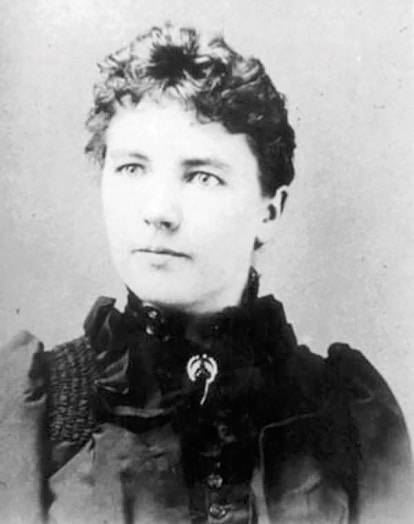Since my childhood, Laura Ingalls Wilder’s books have always mesmerized me with her detailed and awe-inspiring descriptions of her pioneer life. I keep her books in my guest room, and recently, on a wintry and snowy evening, I decided to reread The Long Winter.
The Long Winter is a tale of a family near starvation, of a town crippled by lack of food when blizzards keep the supply train from reaching the settlers. The account, told through the eyes of 13-year-old Laura, takes place in the fall of 1880 and continues through May 1881 in De Smet, South Dakota, during what turns out to have been one of the worst winters in U.S. history. Meteorologists have verified the accuracy of Wilder’s account of the weather.
Blizzard after blizzard sweeps through the town over the next few months. Food and fuel become scarce and expensive, as the town depends on the railroad to bring supplies but the frequent blizzards prevent trains from getting through. Eventually, the railroad company suspends all efforts to dig out the trains that are snowed in at Tracy, stranding the town until spring.
With no more coal or wood, the Ingalls learn to use twisted hay for fuel. For weeks, they subsist on just a little bit of food. As predicted, the blizzards continue for seven months. Beyond any doubt, anyone faced with the vibrant experiences of arduous pioneer life depicted in the Little House on the Prairie series will feel flooded with appreciative emotions for all the little things that make our lives so comfortable.
However, to my mind, The Long Winter wins when it comes to offering an antidote to the emotional conundrum brought about by the nasty start of winter season. The power of this story is unveiled by comparing our winter not to any other season in Colorado, but to the frightful prairie winter season. It’s the story of how poor Laura would be awakened by the blizzard violating her small room, forced to twist hay all day for the hint of warmth and vigorously grind wheat for some crumbs to keep her hunger under control, minding that this is her family’s last food savings. Then, hopeless, she would crawl back under her blanket and shiver herself back to sleep.
There were no more lessons. There was nothing in the world but cold and dark and work and coarse brown bread and winds blowing.
And as a surprise, after Laura’s story, the pathetic negative-15-degree weather as I made my way to church last Sunday (in my heated car) is just a little inconvenience. Reading the whole book is a must, but especially important is the acknowledgement of the ten gifts of the modern era that we should be especially thankful for.
Weather forecasts
“Big snow come” was the most precise weather forecast Laura could count on from the “old Indian”. No more detail than “Big snow, big wind”.
We like to curse the bearers of bad news, don’t we? However, the life without a detailed bad weather forecast meant that Laura’s dad had to take life-threatening risk every day by traveling several miles to gather hay in the little town of De Smet. Because the danger of blizzard was always high, he never knew exactly when it could strike.

Mightier plows
One of the worst situations depicted in her book is that of the snow blockage which blocks all the train traffic for many weeks. The layer of the snow that accumulates around the train tracks is so thick that no plow can manage to remove it.
Thus, the city remains without any supplies and only the most courageous can take on the dangers of deep snow with their horses, hoping the horses won’t get too scared or stuck in the depths of snow.
GPS
The blinding blizzard began as the Ingalls girls were studying. Returning home through the blizzard was a real ordeal as they did not know where they were going, just hoping they were headed in the right direction afraid to freeze to death in the middle of the prairie.
They could hardly walk in the beating, whirling snow. The schoolhouse had disappeared. They could see nothing but swirling whiteness and snow and then a glimpse of each other, disappearing like shadows… She tried to think. The others must be somewhere ahead. She must walk faster and keep up with them or she and Carrie would be lost. If they were lost on the prairie they would freeze to death.
Electricity
When the lamp ran out of kerosene, Ma creatively made a “button lamp.” It was made with axle grease on top of an old saucer, then a button was wrapped in old calico. The calico was then sewed with its corners facing upward, and the tip was lit.
It burned steadily, melting the axle grease and drawing it up through the cloth into itself, keeping itself alight by burning. The little flame was like the flame of a candle in the dark. “You’re a wonder, Caroline,” said Pa. “It’s only a little light, but it makes all the difference.
Sturdier homes
As the winter began, Laura would wake up to notice that the raindrops in her house had frozen.
Her teeth chattered while she pulled on her clothes. Ma was dressing too, behind the curtain, but they were both too cold to say anything. They met at the stove where the fire was blazing furiously without warming the air at all. The window was a white blur of madly swirling snow. Snow had blown under the door and across the floor and every nail in the walls was white with frost.
Heat
As all supplies of coal and kerosene dwindled away, the Ingalls had to work with their bare hands to twist hay into “sticks” in order to burn them in the stove. However, this job was too hard as the hands of the little girl went numb from the cold.
Supplied supermarkets
Yes, it is hard to shovel snow. But remember how hard it was for the family to find food even in the local shop.
The bean barrel was empty. The cracker barrel was empty. The little brine in the bottom of the pork barrel had no pork in it. The long flat codfish box held only a little salt scattered in its bottom. The dried-apple and dried-blackberry box were empty.
Alas, Laura and her parents are forced to feed on crumbs. They have little energy left and are quickly losing weight.
Phones
All day and all night the house trembled, the winds roared and screamed, the snow scoured against the walls and over the roof. In other houses there were people, there must be lights, but they were too far away to seem real.
Electronic entertainment
The boredom of being trapped in the cold and impossible to have fun was overwhelming. It was only making time go by slower and slower. Once, Ma decided to indulge the girls into some “entertainment.” It was a competition of who could recap more of The Independent Fifth Reader from their minds.
Laura tried to listen but she felt stupid and numb. Pa’s voice slid away into the ceaseless noises of the storm. She felt that the blizzard must stop before she could do anything, before she could even listen or think, but it would never stop. It had been blowing forever.
The blizzard-induced brain fog was a constant state of mind.

Public domain via Wikimedia Commons
The right to complain
Of course, it’s admirable to see such young spirits fight the force of nature, and I understand that living in the era when complaining is more than acceptable makes me a weaker person.
I am so tired of brown bread with nothing on it,” Laura said.
“Don’t complain, Laura!” Ma told her quickly. “Never complain of what you have. Always remember you are fortunate to have it.”
Finally, at the end of The Long Winter, a rich Christmas dinner in May is the best gift of all. The song is a reminder that tomorrow is yet to come, and it will be brighter and better than today! What an encouraging finale.
The singing scared away the cold, the young grass was blooming with green color, the wind was warm and pleasant, the sun was warm and mild, and the long winter behind seemed just like a bad memory that dissolved in the tune.


